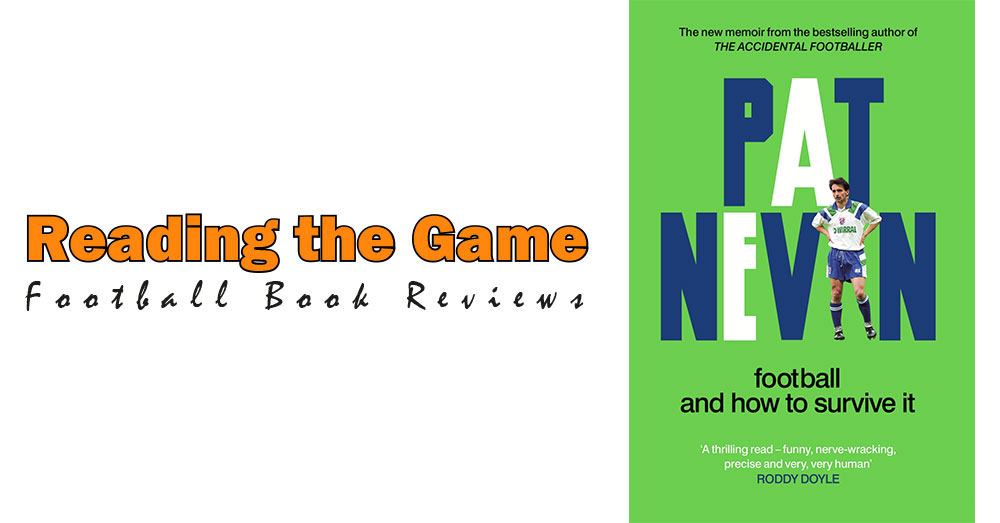After blogging about my favourite football books regularly during 2021 and 2022, I put the Reading the Game series on semi-permanent hiatus, but there are certain football books for which an exception should be made. The second volume of memoir by Pat Nevin, Football and How to Survive It, is one of those.
I was presented with a signed copy of Football and How to Survive It by my wife when the book came out in June; she’d remembered how much I’d enjoyed Nevin’s previous work, The Accidental Footballer and bought me the follow-up as a gift for our wedding anniversary. However, it was after Mr Nevin complemented my T-shirt while talking with Anthony Quinn at the Liverpool Literary Festival that I got my act together and actually read the book.
Covering the second half of Nevin’s career in football, which took in spells at Tranmere Rovers, Kilmarnock and a remarkable period as player/Chief Executive at Motherwell, Football and How to Survive It is less of a freewheeling, carefree read than its predecessor. However, this reflects the author’s changing outlook on life; in the early chapters, Pat Nevin becomes a parent and discovers that his son, Simon, is autistic. This doesn’t become an overarching theme of the book; Simon makes brief appearances from time to time which highlight how difficult life can be for autistic folk while simultaneously celebrating Simon’s qualities and achievements. At the Liverpool Literary Festival, Nevin revealed that he had wanted to include a chapter written by his wife, Annabel, which covered parenthood and the challenges of raising an autistic child in more detail, but this was vetoed by the publisher. As a late-diagnosed autistic myself, I thought this a shame; I would have liked to read Mrs Nevin’s perspective on these issues and how she viewed the shifts in her husband’s career.
Football and How to Survive It is divided into three parts, one of each of the clubs Pat Nevin worked for during the period covered by the book. The author’s renaissance on the Wirral and his part in Tranmere’s attempts to reach English football’s top division forms a joyous tale in its own right, despite bereavements putting Nevin, then a teammate, under enormous strain. We also learn how a stitch-up led to our hero becoming Chairman of the Professional Footballers’ Association; a role which led to him spending an evening looking after Pele.
The chapters centred around a relatively brief spell at Kilmarnock highlight the joy Nevin always sought from playing and the duplicitous way some of those entrusted with running football clubs behave. There’s a hint of sadness in the manner of his leaving the club, despite the principled way in which Nevin took on the Directors.
Then there’s Motherwell. The author’s period running the Fir Park club covers the entire second half of the book and with good reason. Nevin was trying to build a sustainable club, but found he was laying the foundations on quicksand. With the ‘Well beholden to the owner’s other businesses for funding, the football club ends up lurching from crisis to crisis, flailing around like a rubber dinghy, on the Atlantic Ocean, during a hurricane. Nevin’s account of this period covers some incredible highs, including taking a Lear Jet to the 1999 Champions League Final and beating Rangers to claim fourth place in the Scottish Premier League. To go from those moments to Motherwell FC being placed in administration – whereupon Nevin left the club, but not before personally informing the club’s staff of the move – was an astonishing journey, even by modern football’s standards.
Given how often Nevin was undermined during his time at Fir Park, it is remarkable that his telling of the story is free of bitterness or rancour. This is no volume of score-settling or revisionism. Instead, we get a detailed and probably unique description of the inner workings of a Scottish top flight team during a tumultuous and financially ruinous era, despite the author’s careful management of ever-changing budgets.
I called The Accidental Footballer “enormously rewarding” and “an absolute joy to read”. The same is true of Football and How to Survive It but in a slightly different way. This second volume of memoir tackles challenging periods in the author’s life but retains humour and warmth.
Football and How to Survive It is terrific, particularly if you remember football in the 1990s and early years of the 21st century. Copies are available from Stanchion, the football bookshop, or from any of the major outlets.
